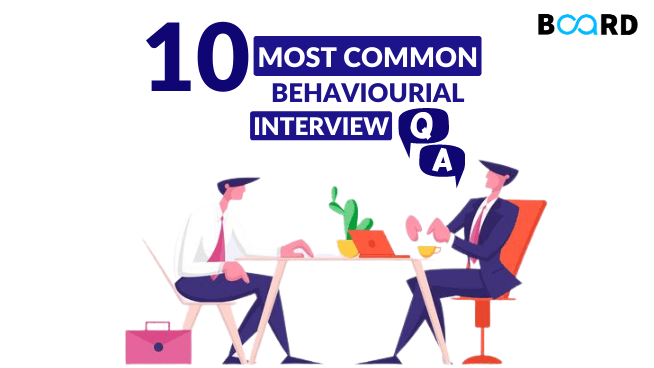
Behavioral interview questions are often used to gauge a candidate’s behavior in certain situations. They are generally problematic situations to test what kind of soft skills the candidate possesses.
You need to put yourself in those situations and answer to the best of your ability. There’s no right or wrong answer, don’t worry!
Here are a few behavioral interview questions and answers that will help you be more prepared for your next interview.
Describe how you handled a challenging situation
Every job has these moments where you’ll be stuck with a trying situation. Maybe your client wasn’t supporting you, your boss went on leave for a month, you had to deal with a difficult colleague, etc. Describe how you came out of a situation as such. This will help the recruiter decide on your team-building, adaptability, leadership and problem-solving skills.
How well can you handle criticism?
This is to check your attitude towards stressful situations and receiving feedback from seniors. You might get harsh criticism along with some constructive ones, too. You need to say how well you receive it with a hope of improving, and how much you appreciate the same without getting defensive about it.
How well can you work under pressure?
All jobs may be stress-inducing at some point or the other. You cannot throw tantrums or you cannot resign just because of that. The interviewer is checking if you can deal with intensely tense situations and what approach you’ll take to tackle it. If possible, do quote a real-life example while you’re trying to explain this point.
Describe how you handled your mistake
To err is human, they say and even the interviewer knows that you must have made mistakes in your job. He is wanting to understand how you dealt with it. You need to highlight your problem-solving skills and how you took onus for the mistake. Highlight how you learnt from it and avoided making one again.
Describe how you overcame a difficulty/barrier
Here you need to describe a difficult time or a difficult phase in your work. Highlight your positive attributes and how you overcame the difficulty. Make sure you only talk about professional barriers and nothing personal, as you will be judged better if you talk of a work environment.
How do you feel about strict deadlines?
This is to check how well you plan and organise yourself. If you do so well, you wouldn’t be facing an issue with strict and short deadlines. You have to talk about how you plan out the schedule and not get uneasy when you’ve to put up with urgency.
What would you do if you disagree with your boss?
Everyone has opinions and it is certainly not wrong to make them known. It’s only wrong when you try to impose it. If you do think your supervisor is on the wrong track, you can express your disagreement very diplomatically and still pledge your support. This way the recruiter will gauge not only your communication skills but also in how you handle complications.
How would you handle a tiff with a peer?
Conflicts are tough to handle, no doubt. Stress on the fact about how you dealt with the delicate situation with maturity and how you spoke openly with that peer to sort all differences out. The interviewer will check how good you are with working in a team and keeping it intact. You also need to tell him that you avoided the same in the future.
Describe how you set a goal and achieved it
Here, the interviewer is checking your hard work and dedication you’ve made to achieve something. Talk about your one professional goal which you decided to achieve to gain promotion, or to gain knowledge. Describe how you planned it out and managed it between heavy workload to achieve it successfully.
How do you spend time outside work?
The recruiter is simply checking your idea of relaxation. He wants to know what kind of a person you are outside the professional environment which will let him gauge your emotions, behaviour and attitude further. You can be honest about what you do and you can also talk about your hobbies. Your hobbies unknowingly say a lot about you.
Prepare for some good storytelling and don’t be intimidated. Associate the situations with your strong skills and pitch it to the interviewer.
All the best!
Oh! So you made it till the end. Here's a bonus video for you.
If you want to crack your dream job interview, check out the Board Infinity's completely free Interview preparation course, which gives you 15 hours of power-packed material to help you get ready for your Placements (or change in career path). It will help you build the right knowledge, skills, and attitude for being a step ahead in the selection process and ensure that you are corporate ready!
